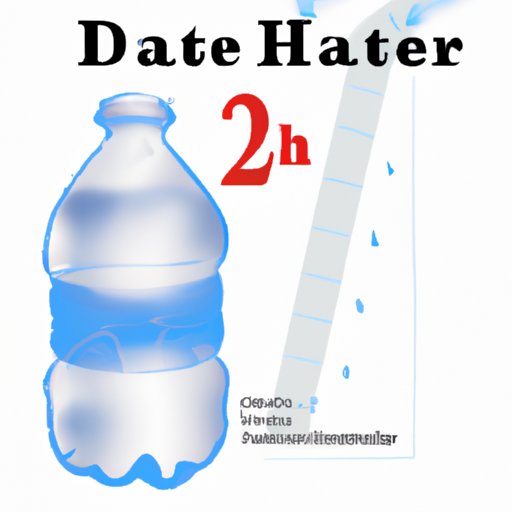An Overview of Dehydration: How Long Does It Take to Get Dehydrated?
Dehydration is a condition that occurs when the body has insufficient levels of water and other fluids. It can lead to serious health complications if left untreated. Understanding how long it takes to get dehydrated is essential for avoiding this condition. In this article, we will explore the causes, symptoms, and prevention of dehydration, as well as the time frame for getting dehydrated.
What is Dehydration?
Dehydration occurs when the body does not have enough fluids, usually due to inadequate intake of water or excessive loss of water through sweating, vomiting, or diarrhea. The amount of water lost must exceed the amount of water taken in for dehydration to occur. It can also be caused by certain medications or illnesses.
How Long Does It Take to Get Dehydrated?
The time frame for becoming dehydrated varies depending on the individual and the circumstances. Generally, it takes several hours or even days to become severely dehydrated. However, mild or moderate dehydration can occur within just a few hours. Factors such as age, activity level, environmental temperature, and medical conditions can all affect how quickly dehydration sets in.
Risk Factors Associated With Dehydration
Certain individuals are more at risk of becoming dehydrated than others. These include infants and young children, elderly people, athletes and people who work outdoors, and those with chronic illnesses or taking certain medications. People living in hot climates are also at greater risk of dehydration.
Exploring the Causes and Effects of Dehydration: How Long Does It Take to Get Dehydrated?
Common Causes of Dehydration
Dehydration is most commonly caused by inadequate fluid intake, excessive sweating, and illness. Other causes include high temperatures, increased physical activity, and certain medications. Vomiting and diarrhea can also lead to dehydration.
Signs and Symptoms of Dehydration
The signs and symptoms of dehydration vary depending on the severity of the condition. Common symptoms include thirst, dry mouth, headache, dizziness, muscle cramps, fatigue, dark-colored urine, and decreased urination. If severe dehydration is left untreated, it can lead to serious health complications.
Potential Effects of Dehydration
The effects of dehydration can range from mild to severe. Mild to moderate dehydration can cause headaches, fatigue, and muscle cramps. Severe dehydration can lead to confusion, fainting, shock, organ failure, and even death. It is important to recognize the signs of dehydration and take steps to prevent it.
A Guide to Understanding Dehydration: How Long Does It Take to Get Dehydrated?
Prevention Tips for Avoiding Dehydration
The best way to avoid dehydration is to drink plenty of fluids throughout the day. It is recommended to drink at least eight 8-ounce glasses of water per day, but this may vary depending on your activity level, environment, and medical conditions. You should also avoid caffeinated and alcoholic beverages, as they can increase dehydration. It is also important to take regular breaks in hot weather and wear light, breathable clothing.
Tips for Recognizing Dehydration in Yourself and Others
If you start to feel thirsty, fatigued, or experience any of the other signs and symptoms of dehydration, it is important to take action. Drink plenty of fluids, rest, and seek medical attention if necessary. It is also important to look out for signs of dehydration in others, especially infants and young children, elderly people, and those with medical conditions.
Dehydration: Symptoms, Prevention, and Treatment – How Long Does It Take to Get Dehydrated?
Dehydration Warning Signs
It is important to recognize the warning signs of dehydration. These include thirst, dry mouth, fatigue, headache, muscle cramps, dark-colored urine, and decreased urination. If you experience any of these symptoms, it is important to take action and drink plenty of fluids.
Treatments for Dehydration
Mild to moderate dehydration can usually be treated by drinking plenty of fluids. If you have severe dehydration, you may need to seek medical attention. Treatment for severe dehydration may include intravenous fluids, electrolyte replacement, and other medications. It is important to treat dehydration as soon as possible to avoid serious health complications.
Staying Hydrated: How Long Does It Take to Get Dehydrated?
Benefits of Staying Hydrated
Staying hydrated is essential for maintaining good health. Adequate hydration helps to keep the body cool, boosts energy levels, aids digestion, flushes toxins, and supports healthy skin and organs. Drinking plenty of fluids throughout the day can help to prevent dehydration and its associated complications.
Strategies for Keeping Hydrated
Drinking plenty of water is the best way to stay hydrated, but there are other strategies that can help. Eating foods that are high in water content, such as fruits and vegetables, can help to increase your fluid intake. You can also try adding electrolytes to your water or drinking herbal teas for extra hydration. Lastly, wearing light, breathable clothing and taking regular breaks in hot weather can help to reduce the risk of dehydration.
Other Ways to Stay Hydrated
In addition to drinking plenty of fluids, there are other ways to stay hydrated. Taking a cool shower or bath can help to cool down your body temperature. You can also use a humidifier to add moisture to the air. Finally, avoiding caffeine, alcohol, and sugary drinks can help to keep your body hydrated.
Conclusion
Dehydration is a serious condition that can occur when the body does not have enough fluids. It can happen quickly, so it is important to understand how long it takes to get dehydrated and take steps to prevent it. Drinking plenty of fluids, eating foods high in water content, and taking other preventive measures can help to reduce the risk of dehydration.
(Note: Is this article not meeting your expectations? Do you have knowledge or insights to share? Unlock new opportunities and expand your reach by joining our authors team. Click Registration to join us and share your expertise with our readers.)
